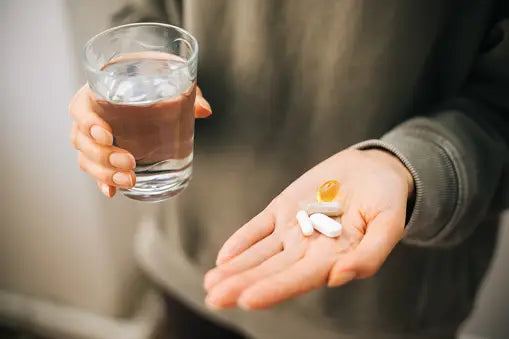

MASSPORT: Big on Muscle Gains
Table of Contents
MASSPORT: Big on Muscle Gains
By Robbie Durand
MASSPORT: POST-WORKOUT ANABOLIC STIMULATOR
Post-workout supplementation has been suggested to be one of the most important variables to maximizing your gains in muscle mass and recuperation. It’s well established that post-exercise muscle recovery, repair, and growth, ultimately determines the benefits of exercise to the development of lean body mass.
Muscle recuperation is reliant on glucose, amino acids, and energy availability for optimal rates of muscle glycogen and protein synthesis. MASSPORT™ is the ultimate anabolic stimulator for protein synthesis, muscle growth, recuperation, and rehydration to promote muscle fullness after you workout. MASSPORT™ contains five key recovery complexes specially formulated for those individuals working to acquire bigger gains from their workout regimen.
After intense exercise, your muscles are like a sponge waiting to soak up nutrients. Consuming MASSPORT™ increases anabolic nutrients aimed to support recovery, protein synthesis, rehydration, muscle fullness and future performance. Massport™ contains a precise blend of carbohydrates and creatine, betaine, glycerol and BCAAs, and glutamine to kick start the growth and recovery process immediately upon consumption.
Massport™ may be the ideal supplement to assist in your overall recovery process. Unlike many other mass gainers, that fill you up, the great thing about MASSPORT™ is that its low in calories, so it won’t affect your appetite and meant to be consumed immediately post exercise so that it won’t affect post-exercise meal.

MASSPORT™ Multi-Layered Stimulus Reinforcer Network:
Glyco-Anabolic Carbon Polymer Component – This complex contains two sources of carbohydrates (i.e. maltodextrin and waxy maize) as well as ingredients to increase insulin response to help those carbs get into your bloodstream faster. Waxy maize starch appears to provide slow, sustained delivery of energy to the body, whereas maltodextrin provides a fast acting response. By combining both types of carbohydrates, your going to get a rapid and slow, sustained levels of glucose for muscle recuperation and energy.
Waxy maize is known to give its user a quick recovery without raising blood-sugar levels. MASSPORT™ contains a mixture of carbohydrates and essential amino acids to enhance muscle glycogen. Glycogen recuperation is essential for muscle recovery and enhanced performance the next day.
Back in 1992, researchers examined the effects of protein, and carbohydrate and protein supplements on muscle glycogen storage during recovery from prolonged, exhaustive exercise. The researchers found that postexercise muscle glycogen storage was enhanced with a carbohydrate-protein supplement as a result of the interaction of carbohydrate and protein on insulin secretion.
Another study found that when subjects were given carbohydrates + BCAA or only carbohydrates during exercise. When carbohydrates + BCAA was supplied the plasma and muscle concentrations of BCAA increased during exercise by 120% compared to 35% for carbohydrates only. So a combination of carbohydrates and BCAAs are essential for muscle recuperation and recovery.
Osmotically-Active Tissue Expansion Component – This component contains taurine, betaine, mannitol, and glycerol. These ingredients have been known to increase cellular water into muscles, which gives the muscle a fuller look.
Taurine– Taurine is a conditionally essential, sulfur-containing amino acid that is the most abundant free amino acid in many tissues. Taurine is different than most other amino acids because it is not incorporated into proteins, but it does play many roles in the body, including cell volume (osmoregulation), detoxification, membrane stabilization, and modulation of excitatory neurotransmission and intracellular calcium levels. Taurine is included in this formula to increase physical endurance and reaction speed, increase concentration and mental alertness, improve the overall feeling of well-being, enhance water balance and nutrient uptake in muscle cells, and aid in restoring hydration status.
Betaine– Betaine is an anti-oxidant and has also been found to stimulate IGF-1 release and insulin receptor signaling pathways. Betaine has also been found enhance stimulation of growth hormone secretion, increase creatine synthesis, and increases in protein synthesis via intracellular hyper-hydration.
Glycerol: Glycerol has been added to this formula to enhance hydration status, increase nutrient delivery, and potentiate the muscle pump associated with resistance exercise. Ingested glycerol increases blood osmolality and draws water into all tissues of the body. Athletes have been experimenting with glycerol ingestion for years, and several studies have been published on the potential benefits of glycerol on endurance performance. A recent meta-analysis concluded that glycerol ingestion increased fluid retention better than water (which is rapidly filtered and cleared by the kidneys) and improved endurance performance by an average of 2.62%.

Anabolic Signal Extension & Reinforcement Component – This complex contains branched-chain amino acids (BCAAs) and glutamine to help kickstart protein synthesis.
Branched Chain Amino Acids (BCAA)
The branched-chain amino acids (BCAA) consist of the essential amino acids leucine, isoleucine, and valine. BCAA account for approximately 35% of the essential amino acids in muscle. In contrast to most essential amino acids that are metabolized in the liver, BCAA are unique because they are metabolized in skeletal muscle. Numerous studies have demonstrated the anti-catabolic effects of BCAA administration, i.e., a reduction in muscle protein breakdown during clinical conditions of wasting (e.g., starvation, post-surgery, burns, liver disease, etc.). BCAA act as signaling molecules to stimulate muscle protein synthesis as well as insulin release from the pancreas. Of the three BCAA, leucine is by far the most important amino acid in this regard. BCAA have been added to this formula to reduce post-exercise fatigue, decrease muscle protein breakdown, and increase muscle protein synthesis.
Glutamine– L-glutamine is the most abundant amino acid in the bloodstream, and it makes up 30-35% of the amino acid nitrogen in your blood. Skeletal muscle is the major tissue involved in glutamine synthesis and is known to release glutamine into the circulation. It’s alleged effects can be classified as anabolic and immunostimulatory. Glutamine plays a crucial role in cellular hydration and leucine uptake, and glycogen replenishment. One study reported that ingestion of glutamine alone appeared to promote muscle glycogen re-synthesis during recovery from exhaustive exercise. However, the addition of glutamine to the glucose polymer drink resulted in a greater storage of carbohydrate.

Creatine Energetic Substrate Component
Creatine– This component contains creatine to boost levels of creatine, which can improve strength and performance. Adults and teenagers who regularly consume these foods typically eat 1-2 grams of creatine per day, an amount that is roughly equal to the body’s rate of creatine degradation. In an average, healthy adult male, 95% of creatine stores are found in skeletal muscle. Since 1992, over 300 research papers have been published on the effects of creatine as a muscle builder and performance enhancer. In general, the majority (~ 65-70%) of these clinical trials have found benefits of creatine monohydrate supplementation, particularly during short, repeated bursts of high-intensity activity. Although responses are variable from person to person, subjects ingesting creatine average a 2-5 pound greater gain in muscle mass, and 5-15% greater increases in muscle strength and power compared to control (or placebo) subjects.
The physiological functions of creatine enhance energy production during intense, repeated muscular activity. More specifically, following its transport and uptake into muscle, creatine is thought to serve at least four vital functions:
- it serves as an energy capacitor, storing energy that can be used to regenerate adenosine triphosphate (ATP);
- it enhances the capacity for energy transfer between the mitochondria and muscle fibers;
- it serves as a buffer against intracellular acidosis during exercise; and
- it activates glycogenolysis (glycogen breakdown) during exercise.
Collectively, these effects allow athletes to perform at higher levels during training, ultimately leading to greater increases in muscle mass, strength, power and high-intensity muscle endurance. Recent studies have also focused on the potential benefits of creatine use on certain neurological and cardiovascular diseases. Creatine has been added to this formula to increase lean mass, improve muscle strength and power, and increase muscle size.
MASSPORT™ supports post-workout gains in:
• Muscle mass and strength.
• Plasma volume, vascularity & fullness.
• Blood glucose recovery & glycogen repletion.
• Protein anabolism
| Roberts MD, Lockwood C, Dalbo VJ, Volek J, Kerksick CM. Ingestion of a high-molecular-weight hydrothermally modified waxy maize starch alters metabolic responses to prolonged exercise in trained cyclists. Nutrition. 2011 Jun;27(6):659-65. |
Goodpaster BH, Costill DL, Fink WJ, Trappe TA, Jozsi AC, Starling RD, TrappeSW. The effects of pre-exercise starch ingestion on endurance performance. Int J Sports Med. 1996 Jul;17(5):366-72.
Carlson LA, Headley S, DeBruin J, Tuckow AT, Koch AJ, Kenefick RW. Carbohydrate supplementation and immune responses after acute exhaustive resistance exercise. Int J Sport Nutr Exerc Metab. 2008 Jun;18(3):247-59.
Blomstrand E, Andersson S, Hassmén P, Ekblom B, Newsholme EA. Effect of branched-chain amino acid and carbohydrate supplementation on the exercise-induced change in plasma and muscle concentration of amino acids in human subjects. Acta Physiol Scand. 1995 Feb;153(2):87-96.
Shennan DB. Swelling-induced taurine transport: relationship with chloride channels, anion-exchangers and other swelling-activated transport pathways. Cell Physiol Biochem. 2008;21(1-3):15-28.
Kendler BS. Taurine: An overview of its role in preventative medicine. Prev Med 1989;18:79-100.
Timbrell JA, Seabra V, Waterfield CJ. The in vivo and in vitro protective properties of taurine. Gen Pharmac 1995;26:453-462.
Bradford RW, Allen HW. Taurine in health and disease. J Adv Med 1996;9:179-199.
Courtenay ES, Capp MW, Anderson CF, Record MT Jr. Vapor pressure osmometry studies of osmolyte-protein interactions: implications for the action of osmoprotectants in vivo and for the interpretation of “osmotic stress” experiments in vitro. Biochemistry. 2000 Apr 18;39(15):4455-71.
Cholewa JM, Guimarães-Ferreira L, Zanchi NE. Effects of betaine on performance and body composition: a review of recent findings and potential mechanisms. Amino Acids. 2014 Aug;46(8):1785-93.
Apicella JM, Lee EC, Bailey BL, Saenz C, Anderson JM, Craig SA, Kraemer WJ, Volek JS, Maresh CM. Betaine supplementation enhances anabolic endocrine and Akt signaling in response to acute bouts of exercise. Eur J Appl Physiol. 2013 Mar;113(3):793-802.
Trepanowski JF, Farney TM, McCarthy CG, Schilling BK, Craig SA, Bloomer RJ. The effects of chronic betaine supplementation on exercise performance, skeletal muscle oxygen saturation and associated biochemical parameters in resistance trained men. J Strength Cond Res. 2011 Dec;25(12):3461-71.
Freund, B.J., Montain, S.J., Young, A.J., Sawka, M.N., DeLuca, J.P., Pandolf, K.B., Valeri, C.R. (1995). Glycerol hyperhydration: hormonal, renal, and vascular fluid responses. Journal of Applied Physiology, 79, 2069-2077.
Koenigsberg, P.S., Martin, K.K., Hlava, H.R., Riedesel, M.L. (1995). Sustained hyperhydration with glycerol ingestion. Life Sciences, 5, 645-653.
Lyons, T.P., Riedesel, M.L., Meuli, L.E., Chick, T.W. (1990). Effects of glycerol-induced hyperhydration prior to exercise in the heat on sweating and core temperature. Medicine and Science in Sports and Exercise, 22, 477-483.
Montner, P., Stark, D.M., Riedesel, M.L., Murata, G., Robergs, R.A., Timms, M., Chick, T.W. (1996). Pre-exercise glycerol hydration improves cycling endurance time. International Journal of Sports Medicine, 17, 27-33.
Murray, R., Eddy, D.E., Paul, G.L., Seifert, J.G., Halaby, G.A. (1991). Physiological responses to glycerol ingestion during exercise. Journal of Applied Physiology, 71, 144-149.
Wagner DR. Hyperhydrating with glycerol: implications for athletic performance. J Am Diet Assoc. 1999 Feb;99(2):207-12. Review.
Goulet ED, Aubertin-Leheudre M, Plante GE, Dionne IJ. A meta-analysis of the effects of glycerol-induced hyperhydration on fluid retention and endurance performance. Int J Sport Nutr Exerc Metab. 2007 Aug;17(4):391-410. Review.
Blomstrand E, Saltin B. BCAA intake affects protein metabolism in muscle after but not during exercise in humans. Am J Physiol Endocrinol Metab. 2001 Aug;281(2):E365-74.
Liu Z, Jahn LA, Long W, Fryburg DA, Wei L, Barrett EJ. Branched chain amino acids activate messenger ribonucleic acid translation regulatory proteins in human skeletal muscle, and glucocorticoids blunt this action. J Clin Endocrinol Metab. 2001 May;86(5):2136-43.
Stein TP, Donaldson MR, Leskiw MJ, Schluter MD, Baggett DW, Boden G. Branched-chain amino acid supplementation during bed rest: effect on recovery. J Appl Physiol (1985). 2003 Apr;94(4):1345-52.
Zanetti M, Barazzoni R, Kiwanuka E, Tessari P. Effects of branched-chain-enriched amino acids and insulin on forearm leucine kinetics. Clin Sci (Lond). 1999 Oct;97(4):437-48.
Anthony JC, Anthony TG, Layman DK. Leucine supplementation enhances skeletal muscle recovery in rats following exercise. J Nutr. 1999 Jun;129(6):1102-6.
Wagenmakers AJ. Amino acid supplements to improve athletic performance. Curr Opin Clin Nutr Metab Care. 1999 Nov;2(6):539-44.
Fumarola C, La Monica S, Guidotti GG. Amino acid signaling through the mammalian target of rapamycin (mTOR) pathway: Role of glutamine and of cell shrinkage. J Cell Physiol. 2005 Jul;204(1):155-65.
Arwert LI, Deijen JB, Drent ML. Effects of an oral mixture containing glycine, glutamine and niacin on memory, GH and IGF-I secretion in middle-aged and elderly subjects. Nutr Neurosci. 2003 Oct;6(5):269-75.
J. L. Bowtell, K. Gelly, M. L. Jackman, A. Patel, M. Simeoni, M. J. Rennie Effect of oral glutamine on whole body carbohydrate storage during recovery from exhaustive exercise. Journal of Applied Physiology Jun 1999, 86 (6) 1770-1777;
M. Varnier, G. P. Leese, J. Thompson, M. J. Rennie. Stimulatory effect of glutamine on glycogen accumulation in human skeletal muscle. American Journal of Physiology – Endocrinology and Metabolism Published 1 August 1995 Vol. 269 no. 2, E309-E315
Branch JD. Effect of creatine supplementation on body composition and performance: a meta- analysis. Int J Sport Nutr Exerc Metab. 2003 Jun;13(2):198-226.
Kreider RB, Almada AL, Antonio J, Broeder C, Earnest C, Greenwood M, Incledon T, Kalman DS, Kleiner SM, Leutholtz B, Lowery LM, Mendel R, Stout JR, Willoughby DS, Ziegenfuss TN. ISSN Exercise and Sport Nutrition Review: Research and Recommendations. Sports Nutrition Review Journal. 1(1):1-44, 2004.
Kreider RB. Effects of creatine supplementation on performance and training adaptations. Mol Cell Biochem. 2003 Feb;244(1-2):89-94.
Rawson ES, Volek JS. Effects of creatine supplementation and resistance training on muscle strength and weightlifting performance. J Strength Cond Res. 2003 Nov;17(4):822-31.

















